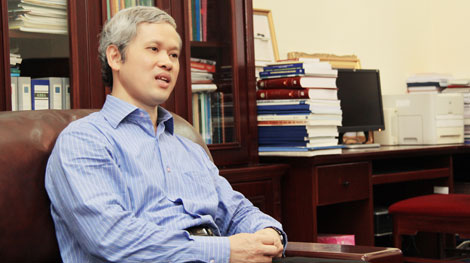Expert sharing view on power hike effect on the GDP

A low consumer price index (CPI) increase provides ideal conditions for the state to raise the price of power and some other major commodities and services to get closer to market levels. But more costly products would badly affect people’s life as well as business performance, would they not?
Power is used both in production and consumption. Therefore, increasing power prices will directly affect not only most of the production sectors through power as an input cost, but also all remaining sectors as well as people’s consumption habits.
The government has carefully considered the case to ensure that the power price increase would not affect the country’s economic growth target this year.
According to our estimates, the 7.5 per cent rise in power price would lead to a 0.46 per cent increase in the CPI for 2015.
Chemical and cement production as well as metallurgy are power intensive industries. Therefore, the new power price would significantly impact their operation, particularly their efforts to boost exports through the lowering of production costs in the context of oversupply. In your view, what would be the appropriate steps to resolve this issue?
Our estimates show that the new power price could drive up production costs in the chemical, metallurgy and cement industries by 0.85 per cent, 0.53 per cent and 0.35 per cent, respectively. This will lower these sectors’ competitiveness against their regional peers.
In order to boost exports, these industries must strive to innovate technology, apply cost-saving measures and increase labour productivity to stay competitive in the world marketplace.
There are arguments stating that low power prices have made it hard for the power sector to attract investors, but increasing prices would make other sectors less appealing to investors. Where do you stand on this?
This paradox does exist. However, we should not encourage investment into energy intensive sectors which abuse natural resources, as in the long-haul this could have a detrimental effect on the sustainability of the country’s development and on our natural reserves.
At this point of time, the attraction of investment needs to focus on technology intensive areas with high added values and having knock-on effects on the production of other sectors, while sparing the environment from excessive damage.
What effect could the new power price have on the GDP and inflation control targets this year, in your view?
Before the power price hike decision came out, the Ministry of Planning and Investment submitted reports to the government and the prime minister on the effects to the country’s economic growth and the CPI this year.
Accordingly, production activities in the first two months were fairly good, as is shown in the fact that the industrial production index produced an on-year jump of 16.4 per cent in January and 7 per cent in February.
Similarly, total retail sales and services revenue also rose sharply. It increased 11.9 per cent in January and 11.6 per cent in February (excluding the inflation-driven price increase factor). The CPI in the first two months fell 0.2 per cent and 0.05 per cent, respectively.
With such favourable conditions, we have reasons to believe that though the increase in power price would have certain impacts on the economy and the inflation control target, we will still be in a position to achieve the 6.2 per cent GDP growth target while keeping inflation under control.
What the stars mean:
★ Poor ★ ★ Promising ★★★ Good ★★★★ Very good ★★★★★ Exceptional
Latest News
More News
- NAB Innovation Centre underscores Vietnam’s appeal for tech investment (January 30, 2026 | 11:16)
- Vietnam moves towards market-based fuel management with E10 rollout (January 30, 2026 | 11:10)
- Vietnam startup funding enters a period of capital reset (January 30, 2026 | 11:06)
- Vietnam strengthens public debt management with World Bank and IMF (January 30, 2026 | 11:00)
- PM inspects APEC 2027 project progress in An Giang province (January 29, 2026 | 09:00)
- Vietnam among the world’s top 15 trading nations (January 28, 2026 | 17:12)
- Vietnam accelerates preparations for arbitration centre linked to new financial hub (January 28, 2026 | 17:09)
- Vietnam's IPO market on recovery trajectory (January 28, 2026 | 17:04)
- Digital economy takes centre stage in Vietnam’s new growth model (January 28, 2026 | 11:43)
- EU Council president to visit Vietnam amid partnership upgrade (January 28, 2026 | 11:00)
















 Mobile Version
Mobile Version